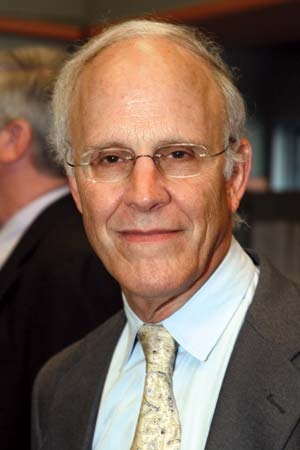Gross, David J.
American physicist
in full David Jonathan Gross
born February 19, 1941, Washington, D.C., U.S.
 American physicist who, with H. David Politzer (Politzer, H. David) and Frank Wilczek (Wilczek, Frank), was awarded the Nobel Prize for Physics in 2004 for discoveries regarding the strong force—the nuclear force that binds together quarks (the smallest building blocks of matter) and holds together the nucleus of the atom.
American physicist who, with H. David Politzer (Politzer, H. David) and Frank Wilczek (Wilczek, Frank), was awarded the Nobel Prize for Physics in 2004 for discoveries regarding the strong force—the nuclear force that binds together quarks (the smallest building blocks of matter) and holds together the nucleus of the atom.Gross graduated from Hebrew University in Jerusalem in 1962 and received a Ph.D. in physics from the University of California, Berkeley, in 1966. In 1969 he joined the faculty at Princeton University, where he began working with Wilczek, then a graduate student. In 1997 Gross became director of the Kavli Institute for Theoretical Physics at the University of California, Santa Barbara.
The prizewinning work of Gross and Wilczek—and Politzer working independently—arose from physics experiments conducted in the early 1970s with particle accelerators to study quarks (quark) and the force that acts on them. (See fundamental interaction.) During their research the three scientists observed that quarks were so tightly bound together that they could not be separated as individual particles but that the closer quarks approached one another, the weaker the strong force became. When quarks were brought very close together, the force was so weak that the quarks acted almost as if they were free particles not bound together by any force. When the distance between two quarks increased, however, the force became greater—an effect analogous to the stretching of a rubber band. This phenomenon became known as asymptotic freedom, and it led to a completely new physical theory, quantum chromodynamics (QCD), to describe the strong force. QCD enabled scientists to complete the standard model of particle physics, which describes the fundamental particles in nature and how they interact with one another.
Gross also did research in superstring theory (string theory), and in 1987 he was coinventor of a new superstring model. In addition to the Nobel Prize, Gross's numerous awards include a MacArthur Foundation fellowship (1987).
- company
- Company school
- Compaq Computer Corporation
- comparable worth
- comparative advantage
- comparative anatomy
- Comparative data for the Sun, planets, and other solar system objects
- comparative ethics
- comparative law
- comparative linguistics
- comparative psychology
- Comparing Apples and Oranges: A Nutrient Scorecard
- Comparison of energy, carbohydrates, and alcohol in some common beverages
- Comparison of Euclidean, spherical, and hyperbolic geometries
- Comparison of the physical properties of molecular forms of hydrogen
- compass
- Compañía Guipuzcoana
- competence and jurisdiction
- competition
- competitive exclusion, principle of
- Compiègne
- complaint
- complement
- complementarity principle
- Complete Peerage, The